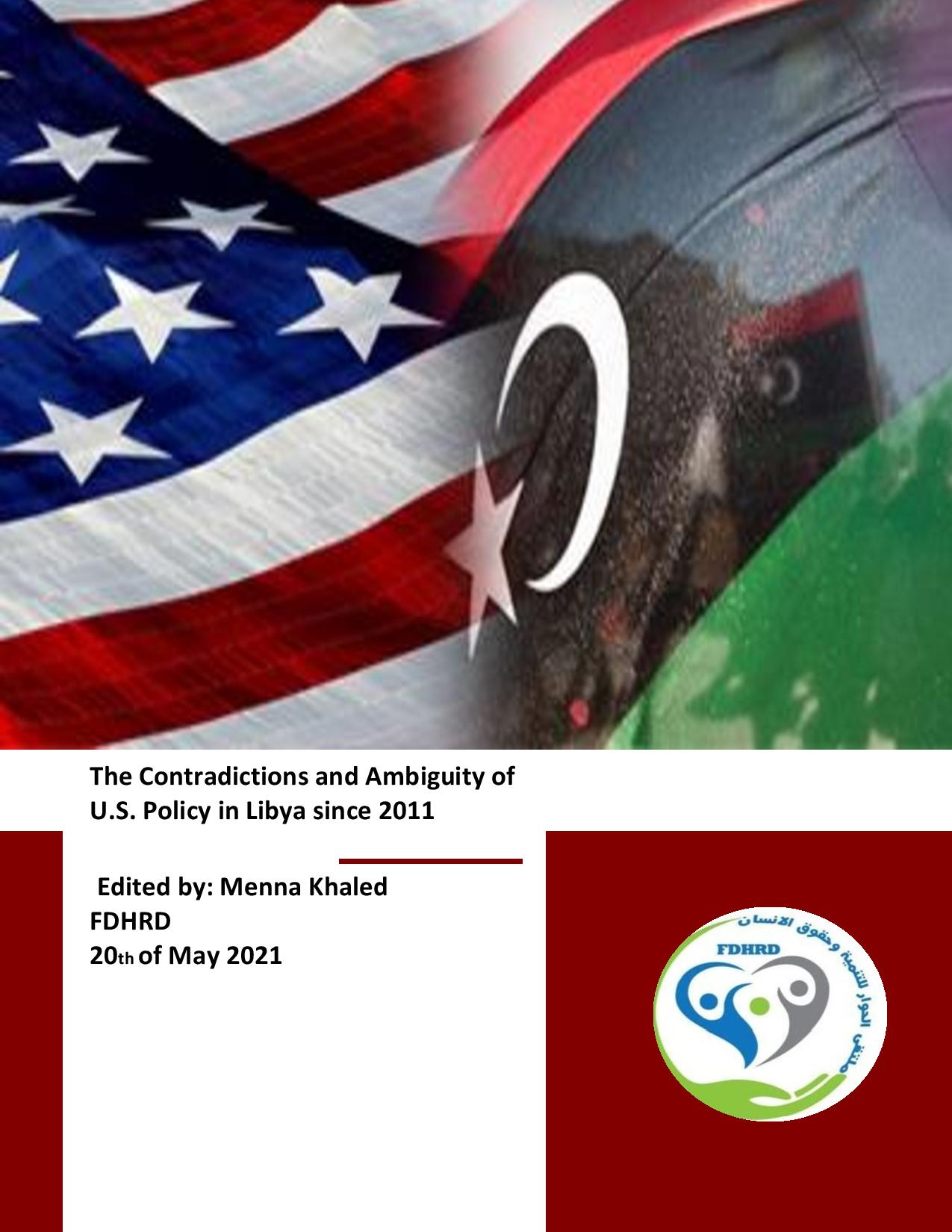Wednesday, 19th May 2021
The Forum for Development and Human Rights Dialogue issues a report about Provisional Detention in Egypt
The unit of researches and studies at the Forum for Development and Human Rights Dialogue issued today, Wednesday 19th May 2021, a report about “Provisional Detention in Egypt”.
The report emphasizes that the origin of provisional detention is a legal procedure taken by the investigation authority or the competent court to guarantee reserving the accused in a safe place till deciding in the lawsuit and accusations against him from one side and to guarantee not to tamper with the case evidences, affect the witnesses of the incident or harming society from another side. The report mentions that the constitution of 2014 highlights the most important guarantees of just trail in accordance with the international standards. In addition, the Egyptian legislator put many restrictions and guarantees for provisional detention which regulate this procedure and achieve its purpose.
The report discusses a number of axes regarding the provisional detention the most important of which are:
The historical development of the provisional detention
In regard to the historical development of the provisional detention, the report reveals that the provisional detention started in law with the issuance of the code of criminal procedure in 1950 which states the provisions of provisional detention. This law has witnessed many amendments among which are: decree-law no. 353 of 1952 then the constitution of 1971 was issued since many amendments have been occurred so that laws suit with the constitution’s provisions. These amendments included the cancellation of courts of state security which were established in accordance with law no. 105 of 1980 and law no. 95 of 2003 which put in important amendments to the provisions of provisional detention, the most recent of these amendments came in the law no. 145 of 2006 and 2013.
Concerning the definition of the provisional detention, the report points out that the Egyptian legislator did not put a specific definition for the provisional detention, yet it only put in rules which address the topic of provisional detention in the code of criminal procedure. But the content of provisional detention may be highlighted in keeping the accused and deprived of his freedom for a renewable limited period of time.
Regarding the legal framework of the provisional detention, the report illustrates that the constitution of 2014 in the articles no. 54, 55 and 56 assure that individuals’ freedom is a right which cannot be violated. Also these articles assure the rights of the detained in addition to protecting the witnesses and reporters. Also the article 54 in the constitution established for dealing with provisional detention since it states “The law shall regulate preventive detention, its duration, causes, and which cases are eligible for compensation that the state shall discharge for preventative detention”.
As for the conditions of provisional detention in law, the report emphasizes that the code of criminal procedure has put in conditions which should be provided upon detaining the accused provisionally. This was stated by the article no. 134 and was replaced by law no. 145 of 2006 since the law allows the investigator to issue an order to detain the accused provisionally if one of these cases or reasons is provided: if the crime is flagrante delicto – fear that the accused may escape – fear of harming the course of investigation whether affecting the victim or tampering with the evidences or have agreements with other accused to change the truth or its features – preventing serious breach of public security which may result from the ‘gravity’ of the crime – if the accused does not have a fixed and known address and he is imprisoned for a crime or misdemeanor whose punishment is imprisonment.
According to the report, regarding the maximum period of the provisional detention, it not allowed that the period of provisional detention in the stage of primary investigations and other stages of criminal lawsuit to surpass one third of the maximum period of the punishment so that it will not surpass 6 months for misdemeanors, 18 months for felonies and 2 years if the punishment of the crime is life imprisonment or death penalty. While as for alternatives of provisional detention, the report illustrates that the Egyptian legislator states in the amendment by law no. 145 of 2006 the alternatives of provisional detention which the investigator can follow instead of issuing an order for the accused’s provisional detention which are represented in: oblige the accused to not leave his house or country, oblige the accused to present himself in the police station in specific times, ban the accused from visiting specific places.
As for the international recommendations and treaties regarding the alternatives of provisional detention, the report points out that the international treaties assert the importance of using alternatives of provisional detention in addition to the importance of imposing alternatives for it and using them in the beginning stages of the lawsuit. In addition, the international treaties and laws were interested in raising awareness in regard to the importance of applying alternative penalties before trailing people considering that provisional detention is one of the procedures which waste individuals’ freedom while they are not officially convicted according to adjudication. A lot of international treaties have tackled the importance of using alternatives for provisional detention.
Besides, the report includes a summary about the important cases, the most famous of which are the two cases no. 1338 and 1413 of 2019 which are known in media as cases of 20 September 2019, in addition to case no. 930 of 2019 state security which is known in media as case of ‘Al Amal Organization’, the two cases 880 and 960 of 2020 state security/limited which known as the two cases of demonstrations of 20th September 2020 and case no. 488 of 2019. The report also includes the resolutions regarding the released the detained in these cases whether resolutions by the court or the attorney general. Also the report tackles the most important resolutions of presidential pardon for the imprisoned.
Regarding the problems of provisional detention, the report illustrates a number of problems the most important of which are:
An open-term provisional detention is one of the new procedures which was inserted as an amendment in the article (143/3) of the code of criminal procedure no. 150 of 1950 according to the which the appeal court or the referral court has the power to extend the period of provisional detention after cancelling its maximum period in felonies whose punishment is life imprisonment or death penalty, so the accused are not to call for temporary release till the issuance of final judgment as for the charge assigned to him which contradicts with the presumption of innocence guaranteed by the current Egyptian constitution and the code of criminal procedure in addition to Egypt’s international commitments stated in the international charters related to human rights in regard to defining the period of provisional detention.
In many times there are inconsistencies in the resolutions issued by some courts as some of them issued based on article 380 of the code of criminal procedure which entrust judges to use their power in provisional detention disregarding the actually amended articles which state the maximum periods of provisional detention.
Renew detention in front of the general prosecution despite of the absence of the accused which contradicts with the articles of the code of the criminal procedures.
Not enable the accused to appeal the orders of provisional detention in contradiction with the code of criminal procedure.
Continue provisional detention in many cases even after two years which is the maximum period stated in law for the provisional detention whether by the general prosecution or resolutions by the head of the court.
There is a clear violation in some judicial departments as they do not apply the law in regard to periods of provisional detention stated by law although the text is clear.
The report concludes some recommendations, the most important of which are:
The necessity of making the provisional detention a preventive procedure and not as a punishment with guarantees to not violate the real personal freedom and freedom of movement guaranteed by constitution and law.
The necessity of issuing a legislation to regulate the process of compensation for provisional detention and who are due to that compensation with the necessity of recognizing the negative impacts in case of extending the provisional detention for long period and sentencing the innocence of the accused and compensate him materially and morally with new legislative texts.
Separate the two authorities of accusation and investigation which the general prosecution has by the existence of competent judge, who is responsible for issuing resolutions of provisional detention, renew provisional detention or release the accused instead of referral court or appeal court.
Using the alternatives of provisional detention according to article 201 of the code of criminal procedure since they play the same expected role of the provisional detention the necessity of using other alternatives of provisional detention such as electronic bracelet.
Stopping the prolonged provisional detention to which the general prosecution and courts resort and commit to the amendments mentioned according to law no. 143 of 2006.
Oblige the general prosecution or courts to cause their judicial orders of provisional detention.








